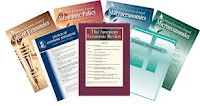
Journal articles are shorter than books and written about very specific topics.
A journal is a collection of articles (like a magazine) that is published regularly throughout the year. Journals present the most recent research, and journal articles are written by experts, for experts. They may be published in print or online formats, or both.
Scholarly or peer-reviewed journal articles are written by scholars or professionals who are experts in their fields. In the sciences and social sciences, they often publish research results.
Scholarly or peer-reviewed journal articles are written by scholars or professionals who are experts in their fields. In the sciences and social sciences, they often publish research results.
Scholarly journal articles often have an abstract, a descriptive summary of the article contents, before the main text of the article.
Scholarly journals generally have a sober, serious look. They often contain many graphs and charts but few glossy pages or exciting pictures.
Scholarly journals always cite their sources in the form of footnotes or bibliographies. These bibliographies are generally lengthy and cite other scholarly writings.
Articles are written by a scholar in the field or by someone who has done research in the field. The affiliations of the authors are listed, usually at the bottom of the first page or at the end of the article--universities, research institutions, think tanks, and the like.
The language of scholarly journals is that of the discipline covered. It assumes some technical background on the part of the reader.
The main purpose of a scholarly journal is to report on original research or experimentation in order to make such information available to the rest of the scholarly world.
Many scholarly journals, though by no means all, are published by a specific professional organization.
 Journal Articles. Journal articles are a major source of information about specific topics, historical to current. Databases are used to find articles written in journals. Some databases cover a discrete field of knowledge, others are multidisciplinary.
Journal Articles. Journal articles are a major source of information about specific topics, historical to current. Databases are used to find articles written in journals. Some databases cover a discrete field of knowledge, others are multidisciplinary.






